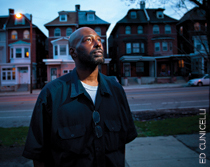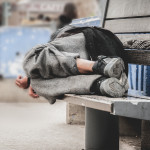For five years, Cliff Williams’s official residence was the Philadelphia shelter system. During that time, the medication he takes for depression was stolen, he worried that staff would share his HIV status as gossip, and because he had to wait for distracted workers to fetch his medication, he was late for medical appointments, in effect forcing him to choose one or the other. No wonder Williams and his doctor decided to delay starting his HIV treatment.  “My viral load was steadily rising,” says Williams, an activist with ACT UP Philadelphia. “My CD4 count was 291, which was really pushing it.” Hospitalized after contracting scarlet fever in the shelters he calls “warehouses for men,” Williams watched his CD4s drop to 203. At that point, his doctor told him, “Whether you’re in the shelter system or not, it’s time for you to go on meds.”
“My viral load was steadily rising,” says Williams, an activist with ACT UP Philadelphia. “My CD4 count was 291, which was really pushing it.” Hospitalized after contracting scarlet fever in the shelters he calls “warehouses for men,” Williams watched his CD4s drop to 203. At that point, his doctor told him, “Whether you’re in the shelter system or not, it’s time for you to go on meds.”
Until last September, when Williams was placed in his own apartment, he was among 8,000 HIV-positive Philadelphians in need of housing. According to research summarized by the National AIDS Housing Coalition, at least half of all people living with HIV lack stable housing at some point in their lives. Without housing, people are less likely to get timely HIV care, less likely to adhere to HIV meds and more likely to die prematurely.
“The No. 1 structural barrier to people taking their meds, in my experience, has been lack of stable housing,” says Lizzy Schmidt, a nurse practitioner at the AIDS services organization Philadelphia FIGHT. For those crashing with friends or family, HIV stigma can block adherence. Without a home last year, ACT UP member Antonio Davis says, “I was sleeping on someone’s couch, and I had to sneak to take my medications.”
Lacking a place to make meals can also hurt adherence and health. “Many meds are better tolerated and absorbed if taken with food,” Schmidt says. “So if someone doesn’t have food when they’re supposed to take their medicine, they might have more nausea or diarrhea, or the drug may not be absorbed as well.”
Three years ago, Williams and his wife were on a waiting list for subsidized housing, staying in separate shelters as AIDS and cancer weakened her health. When he got in trouble for spending his public assistance money on transportation to visit her instead of on shelter fees, Williams advocated for himself by calling his city councilmember’s office—and got kicked out of the shelter.
His options dwindled. He could have stayed in a freezing-cold gymnasium that allowed only four hours of sleep each night, crashed in abandoned buildings or slept on the streets. His wife finally got her turn for housing, but she died in February 2009, before they could move in. Grieving, Williams filled out the familiar paperwork yet again and waited another year and a half alone.
“Living a transient lifestyle like I was, moving from place to place, you might not be able to find water, or just a private place to hash out all these pills,” Williams says. His homeless years have taken a lasting toll. “When I was on the streets and the temperature went down to 30 degrees, it kicked my neuropathy off. Now I can’t do really cold weather, no matter how well I dress. And it added another medication [for neuropathy].”
Now, in his own apartment, Williams says, “My health has improved. I take my medicine on schedule, versus waiting in a long line or being told ‘Come back later.’ Housing gives me a base to work from.” Williams called himself a lone activist when he was penalized for advocating for himself in the shelter. Now he works with a team of activists to get people into real homes, where they can get a full night’s sleep and fight for their rights—and health—every day.
Stay Healthy Without a Home
“Being homeless doesn’t have to prevent you from caring for your health,” says nurse practitioner Lizzy Schmidt.
Plan with your health care team and case manager. “Be honest with your doctor and figure out what works for your living situation,” says Cliff Williams, an HIV-positive activist who was once homeless.
Take your meds. Leave your medications at a place you can get to at the same time every day—an adult day program, your clinic, even a bus station locker. If you have a cell phone, set the alarm for your dosing time. Remind yourself that controlling HIV is a long-term goal, like getting your GED or seeing a child graduate.
Eat. Ask other people where food is available. A free or cheap, well-balanced meal across town is worth the trip. Gather healthy snacks to carry.
Make a map of nearby bathrooms you can use—in public buildings, malls or fast-food restaurants. In case the runs strike, carry a roll of toilet paper and some anti-diarrhea medication or cal-cium supplements. “Or Gummi Bears,” Schmidt says. “The gumminess actually kind of sticks the stool together.”
Drink water to stay hydrated. Get a plastic water bottle to refill throughout the day. Avoid soda and caffeine, and take in electrolytes—things with salt and sugar, like Kool-Aid, chicken noodle soup and Gatorade. Avoid fried or spicy food.
Persevere. “When people tell you ‘No,’ be determined to find the right set of ears,” Williams says of navigating the waiting list and shelter system bureaucracy. “You have to be humble—you’re asking this person for help. They have the power.”
Find serenity. “You need support like I had with ACT UP and Philadelphia FIGHT,” says Williams, who regularly took part in church and HIV education classes and joined an international website, Homelessforums.org, while homeless. Find a support group and a therapist who is experienced with HIV.
Fight for Housing
In order to convince city governments to provide housing for positive people in need, you need a well-organized campaign. Here’s an example:
In Philadelphia, without funding for AIDS housing, “People are dying in shelters and on the streets,” says Antonio Davis of the city’s ACT UP. The group argues that housing everyone with HIV would prevent costly hospitalizations and slow HIV’s spread. Eighty medical and public health professionals agree (see housingistreatment.org).
At a meeting last November, Philadelphia Mayor Michael Nutter apologized to ACT UP member Carla Fields for the shelter conditions that hurt her health. “I don’t want your apology,” Fields replied. “I want you to end the waiting list!”
To mount a campaign, Davis says, build coalitions of supporters; know your facts and create slogans that state your demands clearly; and request meetings with government officials. If your work falls on deaf governmental ears, get rowdy. ACT UP Philadelphia has mounted die-ins at City Hall, caroled outside the mayor’s house and disrupted the mayor’s budget speech with chants of “Homes Not Graves!”
Find a Group to Act Up With
Voices Of Community Activists & Leaders (VOCAL), New York City
vocal-ny.org
Works to stop the city’s AIDS housing program from charging people more than 30 percent of their income for their rent.
Housing Works, New York City
housingworks.org
Is largely responsible for the city’s law guaranteeing housing to poor PWAs.
AIDS Action in Mississippi
601.944.1403
Pushes for supportive housing from the state health department for PWAs.
DC Fights Back
dcfightsback.org
Uses street protests to fight for housing and shelters in the city.
AIDS Foundation of Chicago
aidschicago.org/housing
Fights for housing access.
AIDS Housing Alliance, San Francisco
aidshousingalliancesf.org
Provides housing, defends rent control, pushes AIDS organizations to hire disabled PWAs to prevent homelessness.
No group near you? The National AIDS Housing Coalition’s Policy Toolkit can help you start the fight: Find it at: nationalaidshousing.org/policy-toolkit.
Shelter From The Storm
For people with HIV, housing can mean the difference between health and sickness.






2 Comments
2 Comments